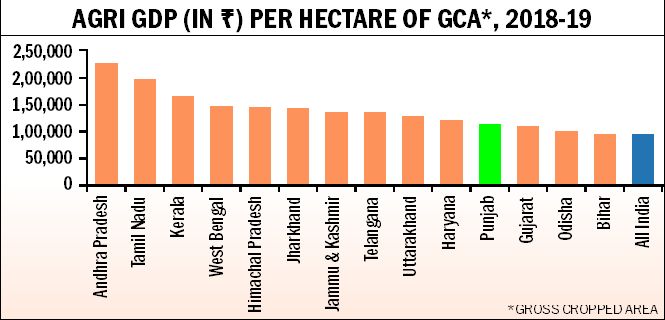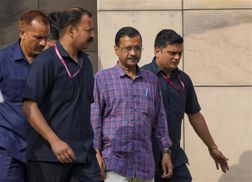
Reality check: On the basis of agri GDP per hectare of the gross cropped area, Punjab is way behind several states, including Andhra Pradesh and Tamil Nadu.
Ashok Gulati
Infosys Chair Professor for Agriculture at ICRIER
Everyone in the country feels proud of Punjabi farmers for the critical role they played during the Green Revolution, from the mid-1960s to mid-1980s. The country was hugely deficit in grain as well as foreign exchange to buy from global markets. It was against this backdrop that in 1965, the Centre set up the Agricultural Prices Commission to recommend MSP for basic staples and the FCI to procure, if the market prices fell below MSP.
It is important to keep this backdrop in mind to understand the opposition to the new farm legislations. There is a fear that these would end the MSP and concomitant procurement system, leading to the demise of APMC mandis, arhtiyas and of state revenue from these mandis. The PM and the Agriculture Minister have repeatedly said all this is a myth. The MSP, the procurement system, and APMC mandis, all are going to stay, except that the farmer will have the choice to sell his produce to anyone outside the APMC mandi. Then why the controversy over the new laws?
A priori, one must recognise that when the backdrop changes, policies and people have to change to adjust to the new reality. Those who refuse to change with changing times, stagnate and are left behind. This is so loud and clear since the beginning of economic reforms in 1991. In that context, it may be noted that by September-end, the FCI would be saddled with grain stocks of about 75 million metric tonnes (MT), against a buffer stock norm of 30.8 million MT, as on October 1. In June, these stocks had touched unprecedented levels of 97 million MT, way beyond the storage capacity of the FCI. Besides this overflowing granary, the country also has bulging foreign exchange reserves touching $540 billion, up from meagre $1.1 billion in June 1991. Therefore, wisdom lies in rethinking our policies and inviting a greater role for private trade. These three laws — the Farmers Produce Trade and Commerce (Promotion and Facilitation) Act, 2020 (FPTC); Farmers (Empowerment and Protection) Agreement on Price Assurance and Farm Services Act, 2020 (FAPAFS); and Essential Commodities (Amendment) Act, 2020 (ECA) — attempt to do precisely that. Their objective is to invite private participants and create competition with the existing system of APMC markets, without demolishing the latter. It would bring down the costs of intermediation, give better choices to farmers, and thus improve their price realisation. Those who don’t want to avail of the alternative system being conceived may keep going to APMC mandis and selling their produce (wheat and rice) at MSP.
But both the ruling and Opposition parties in Punjab don’t believe this. First, they fear that Punjab will gradually lose its revenue from mandi fee and cess, which is 6 per cent of the value of farm produce procured by state agencies on behalf of the FCI (amounting to roughly Rs 3,500 cr). Second, arhtiyas fear that their commission of 2.5 per cent will be under pressure from competition outside the market yard. It is worth remembering that this commission plus mandi fee plus cess, which in total is about 8.5 per cent, used to be 14.5 per cent before the GST reforms came. Punjab had the highest levies in the country and was simply garnering resources by fleecing the FCI. And much of these fees and cess are not audited by CAG as it is not a part of the regular budget, and therefore gives a lot of discretion to political masters to use it the way they like. No doubt, quite a sizeable part of this went to build rural roads connecting villages to mandis, but today, Punjab has achieved all the infrastructure needed to link farmers to markets.
The need of the hour is to be competitive and attract investments in food processing and building efficient supply chains for exports. But if the private trade, say processors or exporters, have to pay MSP plus 8.5 per cent, say on wheat, the very first day they will be out of business. So, investors would go to other states that create an investment climate in line with these laws, say to Uttar Pradesh or Haryana or Madhya Pradesh. Punjab would then lose on employment in food processing industry, and the concomitant GST on that. Punjab needs to weigh its options carefully, whether to remain stuck with wheat and rice and the MSP system, or move forward towards diversification to more high-value crops and food processing.
That reminds me of Prof SS Johl, who raised the voice in the late 1980s that it was time for Punjab to move towards high-value crops. But Punjab did not heed that wise advice. This system of wheat and rice is now playing havoc with the fast-depleting water table, which is accentuated by free power and open-ended procurement, especially of paddy. Stubble burning has emerged as another cause for concern.
In the country as a whole, only 6 per cent farmers benefited from the MSP regime, as per an NSSO report. Obviously, the majority was from Punjab. That dissuaded Punjab to diversify towards high-value crops. Punjab farmers’ income may be high compared to the all India average, but that is primarily because the holding size in Punjab is 3.62 hectares vis-à-vis 1.08 hectares at the all-India level.
Interestingly, on the basis of agri-GDP per hectare of the gross cropped area, Punjab’s ranking is way below. States such as Andhra Pradesh, Tamil Nadu, Kerala, West Bengal, Himachal Pradesh, Uttarakhand, and even Jharkhand are better off in terms of value creation in agriculture. Time for Punjab to wake up!
Join Whatsapp Channel of The Tribune for latest updates.




























